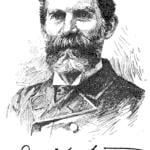There has been a dustup between conservative Eastern Orthodox pundit Rod Dreher and the more liberal Matthew Sitman over the essence of Christianity. In Sitman’s most recent response he goes for what he thinks is the juglar vein of Christianity: grace or salvation or forgiveness. He is probing what is “distinctive,” and have it any way you want and Judaism also teaches forgiveness, but what he ought to be probing is what is “characteristic.” The former focuses on unique bits and different bits while the latter seeks to embrace the essence as a fair description of of the whole.
Dallas Willard’s career was about trying to get those who had reduced Christianity to this “distinctive” element to see the larger picture to find what was “characteristic.” Sitman will soon hear from Dietrich Bonhoeffer that the problem he creates is called “cheap grace” when there is “costly grace.”
Ironically, Sitman thinks Dreher’s too concerned with the “distinctive” and what Sitman offers is yet another version of the “distinctive.”
This obsession with the distinctive leads to a soterian gospel, a Lord who is only Savior (and a means to salvation), a Christian life untroubled by the discipleship demand to be loving and holy, and a heaven that is only about reconciliation with God (called the theocentric heaven). Grace that doesn’t transform isn’t the grace of the Christian faith.
That seems to be the gist of Rod Dreher’s latest response to me in our ongoing exchange about Christianity’s place in the modern world. If you go on and on above love, as I tend to do, what makes such goodwill and charity different from mere “secular idealism”? Rod even breaks out an oft-quoted line from H. Richard Niebuhr, implying that how I discuss Christianity comes perilously close to the following: “A God without wrath brought men without sin into a Kingdom without judgment through the ministrations of a Christ without a Cross.” What he means is that there’s nothing particularly Christian about just being nice to each other or having a “social conscience,” so if that’s all you’re claiming for your faith, then there’s really no need to hang onto all the metaphysical claptrap and depressing talk of sin. Christianity becomes indistinguishable from vague notions of making the world a better place, which is to say it ceases to really be Christianity. If that’s what Rod thinks I’m arguing for, or even where my arguments lead, then I definitely need to clarify what I mean.
The more I’ve considered Rod’s arguments, the more I think he’s trying to pin down what makes Christianity distinctive….
Yet I still find myself approaching Christianity – thinking about its distinctiveness – differently than Rod.
I’ve written this before, but it’s worth reiterating: Christianity is not fundamentally about morality. It is not, finally, just a system of ethics. If Jesus were merely another guru telling us how to live better and more moral lives, with perhaps this or that original flourish, I’m not sure how compelling I’d find his message. Instead, I understand Christianity as a faith for those who can’t help but sin, one that assumes our inability to be moral. And this isn’t because we all fail to uphold certain ideals on occasion, but because we are sinners, meaning that even our supposed good works are tinged with self-interest or self-regard. Nothing pure issues forth from human hands, nothing escapes from the fallibility and brokenness in which we are inevitably implicated. Jesus didn’t just talk about our deeds, but our motives….What I find distinctive about Christianity is that, in the face of all this, it offers the promise of forgiveness…. And this forgiveness comes not as a reward for getting our acts together, but despite the fact we never quite do. Christianity says you are loved unconditionally, loved before you deserve it – which you never really will, anyway. To be a Christian means most of all to perceive, however falteringly, that God forgives and loves you in the midst of your brokenness, and to then live in light of that love. As St. John put it, “We love, because He first loved us.” The order really does matter.











